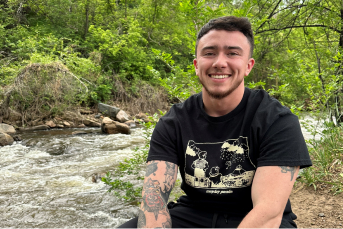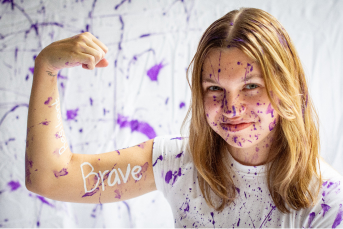Danny is a father and currently works for an abrasives and band saw blades distributor, he was previously a stage manager for an acting troupe - where he met his fiancé, Teresa. “It was difficult to balance full-time work and evenings as a stage manager and get the sleep needed for my epilepsy.”
Danny's epilepsy story
I was diagnosed at 3 years old. When I was 2, my mum gave my brother and I a bath, I got out, slipped and hit my head. To prevent a brain injury my parents kept me up throughout the day. One night when I was over a neighbour’s house, I had a seizure. The neurologist diagnosed me with epilepsy and I've been living with it ever since.
I experience tonic clonic and absence seizures. In the 4th grade I was on 12-15 pills a day. I would have complex partial seizures frequently, I'd have an aura beforehand which felt like a tingling sensation in my hand, it would move up my arm, this gave me time to prepare for the seizure. After a seizure I often experience mood changes, I experience more depression symptoms, such as grieving the loss of the things you can't do.
Read more: Epilepsy and depression, let’s talk about it
Daytime seizures became less frequent as I got older but at night I’d have tonic clonic seizures. My brother slept in the same room, he'd always wake up and yell out to my dad. There was nothing they could do other than roll me on my side. My dad would comfort me and tell me I would be ok.
.webp)
Experience of school with seizures
At 14 years-old I started slowly developing symptoms of a cerebral infection that led to my diagnosis of ataxia dysarthria. My vision became blurry, my speech slurred, while my arms and legs felt heavy. My parents were concerned because my condition deteriorated quickly. One day I collapsed and blacked out in class, and woke up in the hospital but couldn't speak or walk. This was intense. My dad made a cane to help me and I missed school for a month.
I was put on the keto diet, it was difficult to see my siblings eating whatever they wanted but I couldn't and it also wasn’t improving my epilepsy. My parents saw I was finding it difficult to maintain the diet, so they gave me a choice - I decided to stop the diet. Once I was able to speak and walk, I went back to school. At around 15 I stopped having daytime seizures, instead I would have nocturnal seizures.
Depression and epilepsy
I was depressed at college as I couldn't drive. My instructor said 'you have epilepsy, you have to live with it, this is going to be your life' I knew this, but that blunt moment got me on Tumblr, I searched for epilepsy and found so many other people on there. I started an epilepsy blog and helped people with their acceptance.
It really humbled me to accept help from other people, I think men in particular have a hard time with this. I had a podcast but paused this as it got too overwhelming. My fiancé's nephew has epilepsy, he's one of the many reasons I want to start the podcast again, because I wish that when I was younger I had someone older to talk to about my condition who had experienced it themselves.
Using the Epsy App
I downloaded Epsy months ago during my fiancé's pregnancy. I love receiving the daily medication notifications to help with taking my meds, I track when I've had seizures or auras and on what days. Recently I started looking at the content and it’s very cool. I think it's a great thing what the Epsy team is doing to help share other people's stories to make people feel less alone with this condition.
Message to other people with epilepsy
Life is hard but you can't stop, you need to keep going forward. You may think, ‘why keep going?’ Because people can see the potential you have and want to see you succeed. If you decide to not keep going on, that will severely impact those lives around you - the effect will ripple outward. It's important for people to realize the full impact. If things are getting hard, seek help from those around you or a professional, as it's a bad road to go down. Find a community, a blog, a podcast, whatever it is and try to connect with someone else who experiences something similar. That can help you come to terms with your diagnosis.
Learn more: How to find epilepsy support groups
If you would like to hear more about Danny’s story, you can follow him on Instagram @totakeholdof or listen to his podcast To Take Hold Of.

















